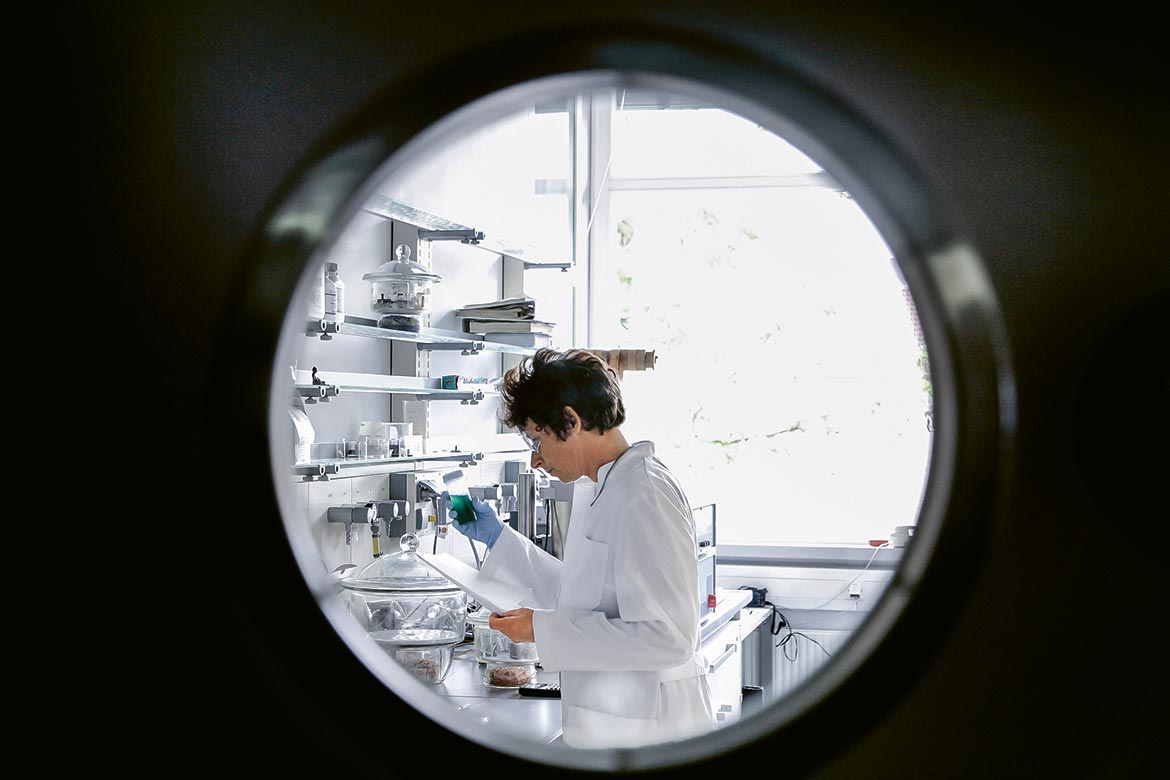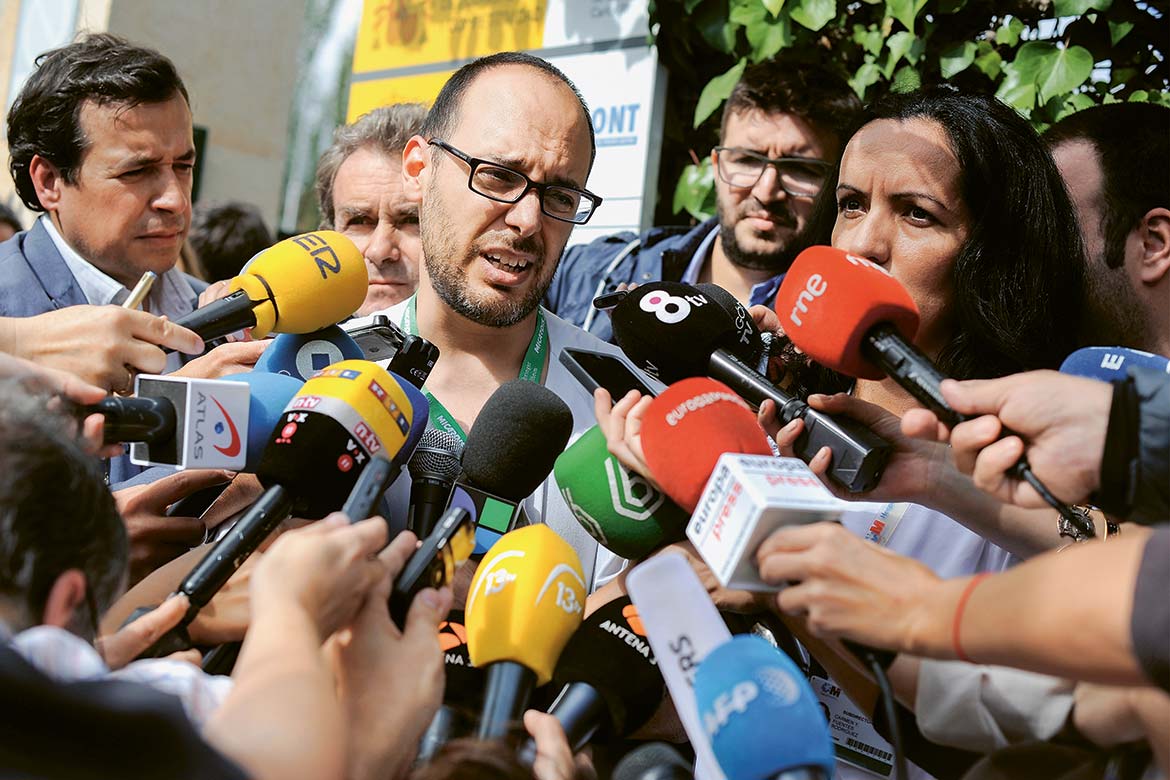INTEGRATED RESEARCH
Federalism vs. scientific fraud
An irreproachable research system requires systematic detection of fraud, impartial investigations and proportionate sanctions. We provide an overview of the situation in Switzerland.

Behind closed doors: Switzerland doesn’t have any independent regulatory body for research integrity. | Image: Westend61 / Getty Images
Ranging from plagiarism to manipulated data to altered publication lists, the Code of Scientific Integrity, published in 2021 by the Swiss Academies of Arts and Sciences and their research partners, has helped to make scientific fraud more visible and establishes a common reference. But assessing the extent of the problem remains difficult. We don’t know if the system currently in place really works because we lack visibility on the phenomenon”, says Nadja Capus, a professor of criminal law at the University of Neuchâtel and the President of the SNSF’s Commission on Scientific Integrity. “Switzerland does not have a systematic method for detecting problematic cases”.
No national statistics
Consequently, the data is scant. The SNSF, for example, analysed 89 suspected plagiarism cases in 2021, detecting 11 cases of minor errors and two more serious situations that led to official reprimands. ETH Zurich reports having conducted three investigations since 2015. The University of Geneva’s annual report mentions a total of seven sanctions brought in connection with labour disputes and harassment, but no cases of scientific misconduct. “The figures should be pooled to get an overview”, says Capus. “They could include internal investigations and sanctions as well as articles retracted following debate among specialists”.
Universities have started to identify individual issues relating to integrity, to publish guidelines and to offer training. However, Swiss institutions that promote and conduct research remain tight-lipped about their internal cases.
Cases are detected through direct reporting or random checks, as is the case with plagiarism at the SNSF. It also relies heavily on the work of scientific journal editors and sites such as Pubpeer and Retraction Watch, according to Brigitte Galliot, the Vice-Rector of the University of Geneva in charge of research and ethics.
It is primarily the employer, i.e., the research institution, that takes up any reports of suspected cases. The SNSF usually bases its possible sanctions on investigations carried out or commissioned by the institution, without necessarily conducting its own investigation. This decentralisation continues within the universities: in Geneva, each faculty has its own integrity commission; some make training on these issues compulsory, others do not.
Why not standardise and centralise case management? “The different disciplines do not face the same problems, for example with regard to data manipulation”, says Galliot. “And the social sciences have a different perception of standards from hard sciences”. The management of scientific integrity is therefore divided among the national players and the universities, between federal and cantonal laws and among disciplines.
Plans for a national body
In order to standardise the process, the idea of establishing a national platform for integrity issues is currently being discussed by the major players in Swiss science policy. They should submit their conclusions by the end of 2023. “We recommend that its mandate be to advise scientists and institutions, not to conduct investigations or to impose sanctions”, says Christina Baumann of the State Secretariat for Education, Research and Innovation (SERI), which is leading the working group. “The universities would remain responsible for investigations and disciplinary measures.
This platform could facilitate access to specialists with experience of such investigations, compile statistics or ensure quality control regarding the way in which cases are handled by institutions, adds Martina Weiss, the Secretary General of swissuniversities. It would not be responsible for hearing allegations but would refer people to their institution. This model would be similar to the one in the UK (see box).
“This is a step in the right direction, but I think we could go further”, says Capus, in her personal capacity. “Sharing suspicions of improper behaviour is particularly difficult at the beginning of one’s career, when one depends on one’s colleagues, their recommendations and their network. A national, anonymous reporting centre could reduce this barrier”. The reputations of institutions are better protected by externally commissioned investigations removing doubts than by an employer clearing its own staff, according to her. Moreover, “not all small institutions have the expertise to investigate misconduct” and cannot build up experience with only a handful of cases per year.
The current legislation does not offer much room for manoeuvre. It is the cantons that determine when to sanction staff at their universities. And passing on information about suspected misconduct can run up against cantonal legislation, says Capus. But things are changing: the University Act of the Canton of Bern now specifies integrity issues, e.g., the exchange of information with research or funding partners or disciplinary aspects including fines.
It is questionable whether the sanctions are a sufficient deterrent. In Switzerland in 2021, a third of one scientist’s publications were found to contain errors in his favour, leading only to a reprimand. In the US, the manipulation of 24 images published in seven articles, a thesis and funding applications led only to that researcher’s work being monitored for four years.
No justice without personal injury
Harsher sanctions do often come through the courts. This creates a financial barrier, however, as complainants must bear the costs of the proceedings if they fail. In order to appeal the decision of a university to clear one of its employees, there is a burden of proof regarding personal harm from the alleged fraud, according to a ruling by the Vaud cantonal court in May 2021 – which is rather difficult in the case of scientific research.
The way in which the medical profession deals with misconduct could be used as an example. Here too, the cantons and the magistrates play a central role. The Swiss Medical Association (FMH) can issue a reprimand or expel a member, which is unpleasant but in itself does not prevent that person from practising. Furthermore, exclusions are only pronounced for serious cases, where the cantonal administration has already withdrawn the authorisation to practise medicine, says Yvonne Gilli, the President of the FMH. Such a withdrawal is not communicated directly by the canton, and in practice only occurs after a complaint by a patient.




